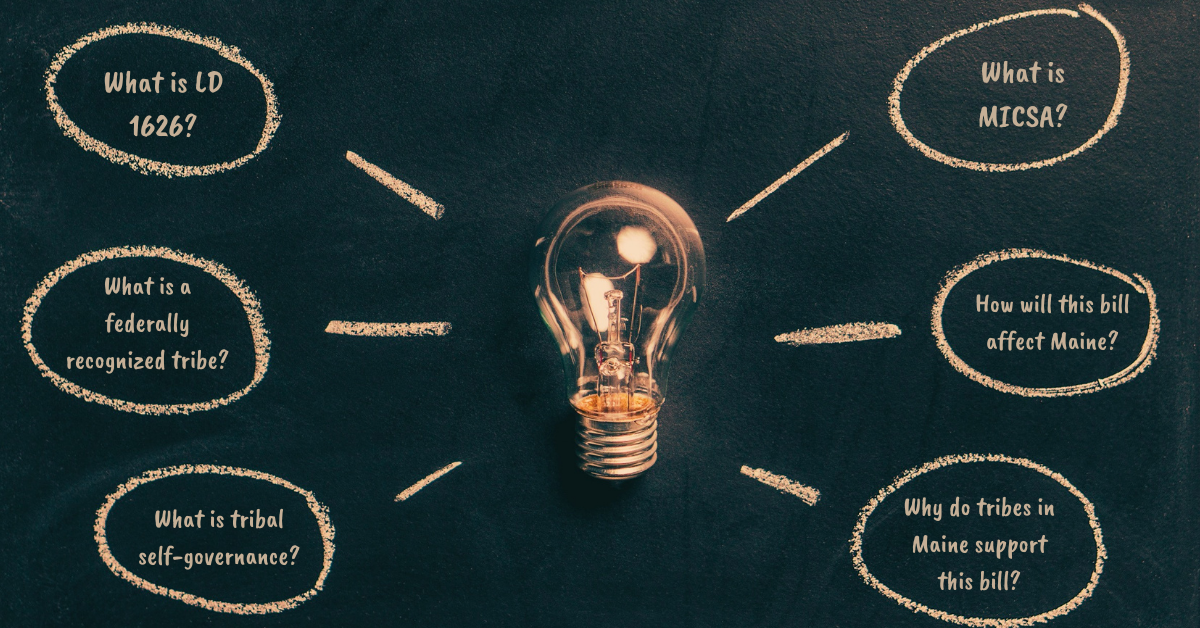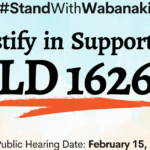What is LD 1626? Why do tribes in Maine support it? Why should I ask my legislators to pass it? We answer these and other questions in our LD 1626 Frequently Asked Questions below. You can also download a PDF of the FAQ to print HERE.
What would LD 1626 do?
The legislation would place the tribes in Maine on similar and equal footing to the other 570 federally recognized tribes in 49 other states. This bill would amend the Maine Implementing Act to restore the inherent right of the Passamaquoddy Tribe, the Penobscot Nation, and the Houlton Band of Maliseet Indians to self-govern within their respective territories in accordance with the same federal laws that generally govern tribal lands elsewhere in the United States. LD 1626 would accomplish this goal by enacting most of the consensus recommendations issued by a bipartisan task force established by the Maine Legislature to address long-standing issues with the Maine Indian Claims Settlement Act (MICSA) and the state law that accompanied it, the Maine Implementing Act.
What is MICSA and the Maine Implementing Act?
In the 1970s, the Passamaquoddy Tribe successfully sued the United States to establish the tribe as a federally recognized Indian tribe to whom the United States owed a special trust responsibility. In the years that followed, state and federal courts recognized that the tribes in Maine had the same sovereign powers as tribes elsewhere in the country. Around this time, the U.S. government sued the state of Maine on behalf of the Passamaquoddy Tribe and Penobscot Nation over the illegal sale and seizure of tribal lands in violation of the federal Non-Intercourse Act of 1790. Known as the “Settlements Acts,” MICSA and the Maine Implementing Act (MIA) accomplished two primary objectives: 1) settled the United States’ land claims suit; and 2) restored state jurisdiction over the tribes that was lost after the tribes obtained federal recognition in the 1970s. As part of the settlement, the federal government placed $81.5 million in trust for the tribes to buy back a small portion of their original land from willing landowners. The settlement did not “give” lands to the tribes. The Passamaquoddy Tribe and Penobscot Nation are each eligible to acquire up to 150,000 acres of trust land in specific areas identified in the MIA. Trust land is a category of land holding in which the federal government holds the land in trust on behalf of a particular tribal government. Generally speaking, elsewhere in the United States, tribal trust land cannot be sold, condemned, or taxed or subject to state jurisdiction without federal approval. To this day, neither tribe has been able to purchase the full amount of land provided for in the settlement. The Houlton Band of Maliseet Indians received the federal funding for their land acquisition program from the Passamaquoddy and Penobscot settlement. No guaranteed acreage was provided for the Houlton Band of Maliseet Indians.
What is tribal self-governance?
The right of an Indian tribe to self-govern, which is a fundamental attribute of tribal sovereignty, is the inherent right of tribes to enact and enforce laws concerning activities, people, and entities within their tribal territory. The U.S. Constitution recognizes three sovereign entities in the United States: 1) the federal government; 2) Indian tribes; and 3) states. Under the Constitution, tribes generally have the same powers, with a few exceptions, as federal and state governments with respect to the regulation of affairs on tribal land. This includes their inherent right to sustain traditional cultural values and practices, establish their own form of government, determine membership requirements, enact legislation, and establish law enforcement and court systems. The concept of tribal self-governance means a tribal community may determine what is in its best interest and develop social and economic policies as it sees fit, all without outside interference. In a pure sense, tribal self-governance ensures that any decisions that affect the tribes with regard to their property and citizens are made with their participation and consent. Tribes across the United States that operate under the self-governance model of tribal sovereignty are still subject to federal statutes and court decisions that are generally applicable to tribes and their citizens.
The Settlement Acts were intended to resolve years-long legal conflicts between the tribes in Maine and the state. Did it work?
No. A fundamental pillar of the Settlement Acts was a pathway for the Passamaquoddy Tribe and Penobscot Nation to each acquire up to 150,000 acres of trust land. That has not happened for either tribe. The Settlement Acts have also failed to bring legal certainty to tribal-state relations, as litigation over differing interpretations of the acts began shortly after their enactment and has not abated since. Soon after the legislation was enacted, the state asserted that by signing the Settlement Acts, the tribes had agreed to be treated as municipalities by the state, giving up rights the tribes never knew to be on the table. The state has consistently maintained the tribes are almost entirely subject to state law and cannot benefit from numerous laws passed by Congress since 1980 for the general benefit of Indians. The tribes have disputed these interpretations and the result has been more than 40 years of continued litigation.
Who came up with the recommendations that LD 1626 would enact into state law?
A 2012 report from the Maine Indian Tribal-State Commission, created by the 1980 Maine Implementing Act to continually review its effectiveness, found that MICSA “created structural inequities that have resulted in conditions that have risen to the level of human rights violations.” In 2019, acknowledgement of these inequities and the determined diplomacy of Wabanaki Tribal Governments prompted the Maine Legislature to create the Task Force on Changes to the Maine Indian Claims Settlement Implementing Act. The task force was composed of a bipartisan group of tribal leaders, legislators, and state officials. After six months of hearings, meetings, interviews, and research, the task force issued a report in January 2020 with 22 recommendations to restore tribal self-governance over a range of issues, including the prosecution of crimes on tribal lands; the regulation of fishing, hunting, and other uses of natural resources on tribal lands; gaming; taxation; and land acquisition. In 2020, legislators introduced a bill (LD 2094) to enact most of the consensus recommendations. (Watch excerpts from that public hearing from the Sunlight Media Collective.) The bill died when the Legislature adjourned in March 2020 due to the pandemic. LD 1626 was introduced at the beginning of the current legislative session. It would enact almost all of the task force recommendations.
Why do tribes in Maine want LD 1626 passed?
Passing LD 1626 is about fairness and equity. For the last 40 years, even though tribes in Maine never ceded all rights guaranteed to them as federally recognized tribes, the state government and courts have used language in the settlement to treat the tribes as little more than municipalities and as less than the other 570 federally recognized tribes. Under MICSA, tribes in Maine have been unable to benefit from more than 150 federal laws passed since 1980, missing out on opportunities for economic development, to increase access to health care, respond to natural disasters, and expand environmental protections. In addition, the Wabanaki tribes have watched from afar as tribes elsewhere in the United States received opportunities to foster job creation, protect safe drinking water, and take action under the Violence Against Women Act against the epidemic of violence against native women. LD 1626 would take tremendous steps to ensure that the Wabanaki tribes are generally treated like all other federally recognized tribes.
What is a federally recognized tribe?
According to the Bureau of Indian Affairs in the U.S. Department of the Interior, a federally recognized tribe is “an American Indian or Alaska Native tribal entity that is recognized as having a government-to-government relationship with the United States, with the responsibilities, powers, limitations, and obligations attached to that designation.” Federally recognized tribes possess the inherent right to self-govern and as such are entitled to certain benefits, services, and protections established under federal law. There are currently 574 federally recognized American Indian and Alaska Native tribes and villages, including the Penobscot Nation, the Passamaquoddy Tribe, the Houlton Band of Maliseet Indians, and the Mi’kmaq Nation in Maine. However, because of the 1980 Settlement Acts, the tribes in Maine are denied many of the same rights held by all other federally recognized tribes.
What are some of the rights that other federally recognized tribes have that tribes in Maine don’t?
The right to self-govern is a cornerstone of any sovereign nation and is held by all federally recognized tribes. However, the Settlement Acts prevent the tribes in Maine from exercising this right as the vast majority of tribes elsewhere in the United States do. Among the rights denied to the tribes in Maine are:
- The right to exercise criminal jurisdiction over all categories of crimes committed by Native Americans on tribal lands.
- The right to legislate and adjudicate civil regulatory issues arising on tribal lands, such as the right to enact and enforce environmental quality controls or to regulate on-reservation businesses.
- The right to levy and collect taxes.
- The right to conduct gaming in collaboration with state and local governments.
- The right to be immune from lawsuits by private individuals and state governments.
- The right to acquire reservation and trust lands without the consent of local and state governments.
Learn more about the rights of federally recognized tribes from Indian Affairs in the U.S. Department of the Interior.
Will I be able to hunt or fish on land acquired by tribes in Maine if LD 1626 becomes law?
Generally speaking, yes. Tribal lands in Maine are typically open for public access and recreational use unless they have been closed for a specific reason. Hunting and fishing on tribal lands typically requires a permit, as would be the case on state or federal lands. Just as any private landowner in the state, tribes in Maine have the right to post their land. With few exceptions, tribes in Maine do not post their land.
If passed, would LD 1626 affect property taxes in neighboring towns or reduce a town’s existing tax base?
LD 1626, as introduced, includes language that allows the Passamaquoddy Tribe and the Penobscot Nation to reach agreements with municipalities regarding payments in lieu of taxes after certain lands are converted to federal trust status. A tribe can only obtain Trust land (which is not taxable) through the “fee-to-trust process,” a rigorous undertaking conducted under federal statutes and the Department of the Interior regulations. These applicable federal regulations require a consideration of the impact that the fee-to-trust process will have on local tax rolls. This process also provides an opportunity for state and local governments to provide comments and to be consulted prior to completion of the fee-to-trust process.







